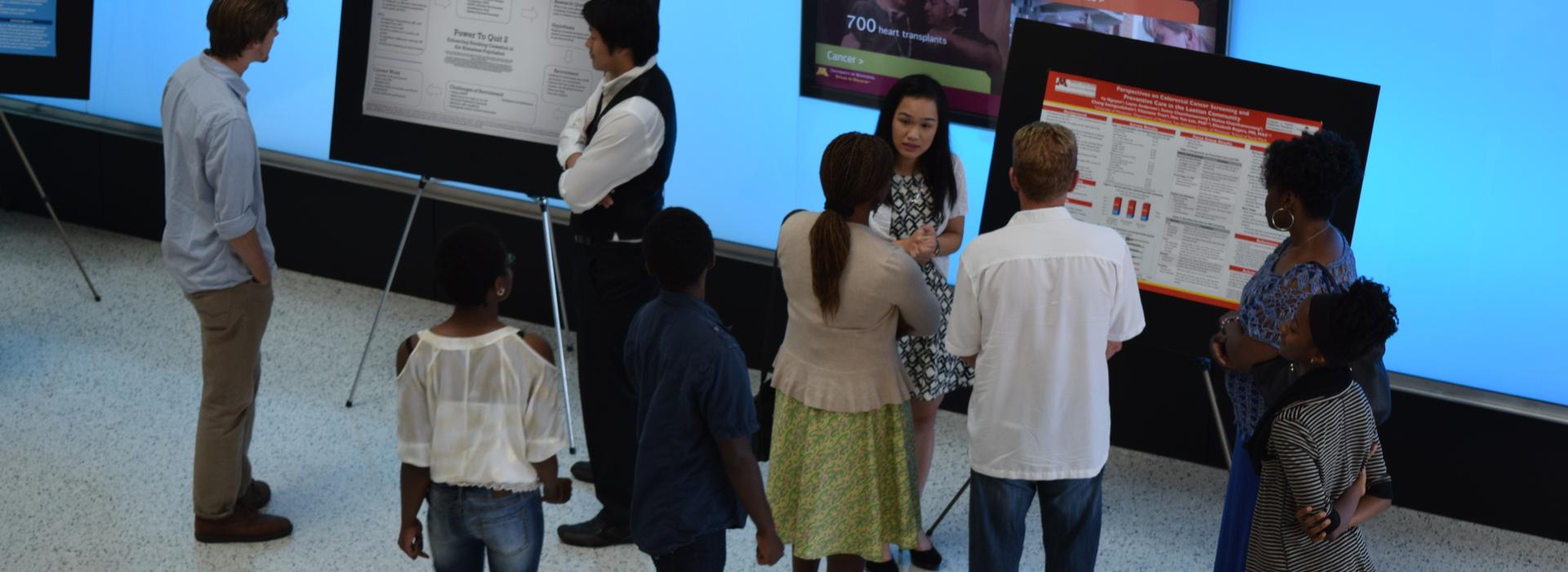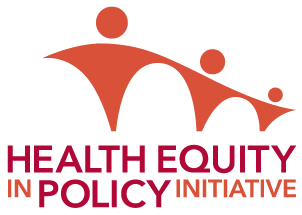
About
Land Acknowledgement
As part of the University of Minnesota Twin Cities Campus, the Program in Health Disparities Research (PHDR) acknowledges that we reside on traditional, ancestral, and contemporary land of the Dakota people, land ceded in the Treaties of 1837 and 1851. The 1837 and 1851 Treaties were presented as mutually beneficial, masking their true purpose as a wide-ranging effort to marginalize or even exterminate indigenous peoples. As a land-grant university operating on Dakota land, the University of Minnesota has benefited from commercializing this land, generating billions of dollars annually in economic and academic activities that have provided little or no benefit to the Dakota people.
PHDR’s vision is to eliminate health disparities in Minnesota and beyond, and thus has always included the goal of eliminating health inequities in Native American communities. As part of this land acknowledgement, we commit to redoubling our efforts toward this goal. We recognize that the Dakota people continue to live in exile on their land and that racist policies and actions continue to impact Native individuals today. Therefore, we commit to increasing awareness and educating the campus and our communities about how the theft of Indigenous lands impacts the health and wellbeing of its people. Our goal is to share knowledge, including Indigenous wisdom, on equitable practices within research.
By offering this land acknowledgement, we recognize the sovereignty of Native and tribal nations. We commit to joining with Native communities in their traditional role as stewards of the land, and we stand willing to shoulder our share of the responsibilities in that regard.
In addition to this land acknowledgement, we offer a list of commitments to hold us accountable to our decisions and actions.
Land Acknowledgement - Commitments
We commit to the following, recognizing our commitments will evolve with growing knowledge and partnerships. We will collaborate with Native American communities to enact these commitments.
-
Invite a speaker from a Native American community to present at at least one of the Health Equity Seminars annually.
-
Partner with a Native American organization or community member to host a Community Dialogue Series event.
-
Extend recruitment efforts to Native American communities to apply for the Health Disparities Pilot Grants.
-
Recruit and include Native American trainees and students at all levels in PHDR educational programs.
-
Utilize PHDR resources to amplify Native American voices and health concerns.
-
Prioritize research that addresses topics of high interest to Native American communities and increase representation of Native-identified issues in PHDR research programs including on our Community-Academic Board.
-
Support, amplify and buy from Native American-owned businesses.
-
Identify strategies to deepen trust in research participation with Native American communities.
-
Evaluate PHDR programs and materials annually on how well we interact with Native American communities.
-
Revisit and update this list of commitments annually.
Land Acknowledgement - References
Native Governance Center https://nativegov.org/about/our-land-acknowledgement-statement/
Honor Native Land Guide https://usdac.us/nativeland
Dakota and Ojibwe Treaties http://treatiesmatter.org/treaties
Univ. of MN Land Acknowledgement Workshop Slides https://drive.google.com/file/d/18_uQBahPN-wHbuuG6GhaisrGTXIhMw0e/view
Map of Native and Indigneous Lands Native-Land.ca | Our home on native land
Social Justice and Racial Equity
We seek to create systems change that centers and champions diverse and marginalized
perspectives. Our commitment to social justice and racial equity guide our decisions regarding
hiring, programs and activities, partnerships, and budget priorities.
Community-Centered Partnerships
Communities are at the center of what we do. We nurture equitable and mutually beneficial
community-driven and community-centered collaborations based on integrity, authenticity,
transparency, and fairness.
Translating Community Knowledge into Action
We believe community expertise and knowledge are integral (essential) to eliminating health
disparities. Through collaborative research and dissemination, we co-produce knowledge that
generates meaningful action to advance health equity.
10 strategic initiatives for a 3 year plan
In the first year we have started with the following 5 initiatives:
1) Establish and act consistently with PHDR operating values
2) Deepen PHDR cohesion between its board, faculty, and staff
3) Visibility, Convening, and Connecting: Elevate PHDR visibility within the university and Medical School
4) Dissemination: Become national leaders in Community-centered Dissemination
5) Research: Expand interdisciplinary extramural funding
We will continue to work on the current initiatives in addition to remaining initiatives for years 2-3:
6) Visibility, Convening, and Connecting: Connect PHDR and communities through community-engaged research
7) Community engagement, Support, and Partnerships: Utilize community-engaged research to promote health equity in communities and support communities in capacity building
8) Provide training and workshops for community and academic partners in Community-Based Participatory Research (CBPR), Community-centered Dissemination (CCD), and other health equity topics
9) Develop and implement a policy plan that promotes and embodies health equity.
10) Better understand and evaluate the impact of PHDR programs and activities
Health Equity in Policy Initiative (HEPI)

Health Equity in Policy Initiative (HEPI) is a component of the Program in Health Disparities Research at the University of Minnesota Medical School.
Mission
Our mission is to bridge persistent information gaps between researchers, communities and policy-making bodies, specifically related to health disparities.
Objectives
- To leverage community and research for a collective voice to inform more equitable and effective health policies.
- To support researchers in the generating of evidence to support health equity in all policy.
- To engage communities in using research and personal stories to share concerns and recommendations with decision makers to support health equity in all policy.
Just Released - Economic Benefit of Achieving Health Equity in Minnesota
Citation: Allen M, Myers S, Ahmed H, Durfee T, Kent K, Moua V, Xu M, Wilcoxon, A, Nanney MS. (2018). Economic Benefit of Achieving Health Equity in Minnesota (Technical Report). University of Minnesota Health Equity in Policy Initiative. Available at https://www.med.umn.edu/healthdisparities/policy
HEPI Documents
- Health Equity in Policy Initiative (HEPI) Postcard
- Hear From our Community: Two-Spirit / Lesbian, Gay, Bisexual, Transgender and Queer Communities of Color in Minneapolis
- Hear From our Community: Cedar-Riverside Neighborhood in Minneapolis
- Hear From our Community: Little Earth / Phillips Neighborhood in Minneapolis
- Short Oral Presenter. Marilyn S. Nanney, Khalid Adam, Huda Ahmed, Sarah Gollust
- Safe Routes to School Legislation: What do underserved communities want decision makers to know? International Society of Behavioral Nutrition and Physical Activity. Edinburgh, Scotland. June 6, 2015.
- Oral Presention. Marilyn S. Nanney. Connecting Under-represented Communities to Legislators on Active Living Policy Discussions. 2015 MN Academy of Family Physicians Research Forum. Bloomington, MN. March, 14, 2015.
- Invited Presentation. Marilyn S. Nanney & Roxanne Anderson. Public Spaces and Active Transportation. What the LGBTQ Two-Spirit Communities of Color Want Decision Makers to Know. University of Minnesota Program in Human Sexuality. Minneapolis, MN. January 14, 2015.
- Poster Presenter. Huda Ahmed, Khalid Adams & Marilyn S. Nanney. Hear Our Voices: A Case Study Connecting Under-represented Communities to Legislators on Safe Routes to School. Engaging Communities for Change. Alberta, Canada. October 7, 2014.
- Invited Presentation. Roxanne Anderson and Marilyn S. Nanney. Public Spaces: Challenges and Recommendations to Decision Makers from the LGBTQ & Two-Spirit Communities of Color. Trans Health Equity Conference. Minneapolis, MN. September 25, 2014.
- Invited Presentation. Sarah Gollust & Marilyn S. Nanney. Addressing Childhood Obesity: Policy Options and Lessons from a Policy-University Collaboration. National Conference of State Legislatures – National Caucus of Native American State Legislators. Minneapolis, MN. August 18, 2014.
Contact
Our team welcomes all opportunities to share more about the project process and findings. For inquiries, please contact phdr@umn.edu.
Our Operating Values
SOCIAL JUSTICE AND RACIAL EQUITY We seek to create systems change that centers and champions diverse and marginalized perspectives. Our commitment to social justice and racial equity guide our decisions regarding hiring, programs and activities, partnerships, and budget priorities.
COMMUNITY-CENTERED PARTNERSHIPS Communities are at the center of what we do. We nurture equitable and mutually beneficial community-driven and community-centered collaborations based on integrity, authenticity, transparency, and fairness.
TRANSLATING COMMUNITY KNOWLEDGE INTO ACTION We believe community expertise and knowledge are integral (essential) to eliminating health disparities. Through collaborative research and dissemination, we co-produce knowledge that generates meaningful action to advance health equity.
Policy
Through the Health Equity in Policy Initiative, Program in Health Disparities Research seeks to bridge the information gaps, which exist between underserved communities, researchers, and decision makers through policy initiatives that promote the health and safety priorities of its community partners.
Contact
Program in Health Disparities Research
717 Delaware Street SE, Suite #166
Minneapolis, MN 55414
Primary Contact:
Telephone: (612) 625-1654
Email: phdr@umn.edu
Director:
Michele L. Allen, MD, MS
Director, Endowed Chair of Health Equity Research, Co-director of CTSI’s Community Engagement to Advance Research and Community Health (CEARCH), Associate Professor
Email: miallen@umn.edu